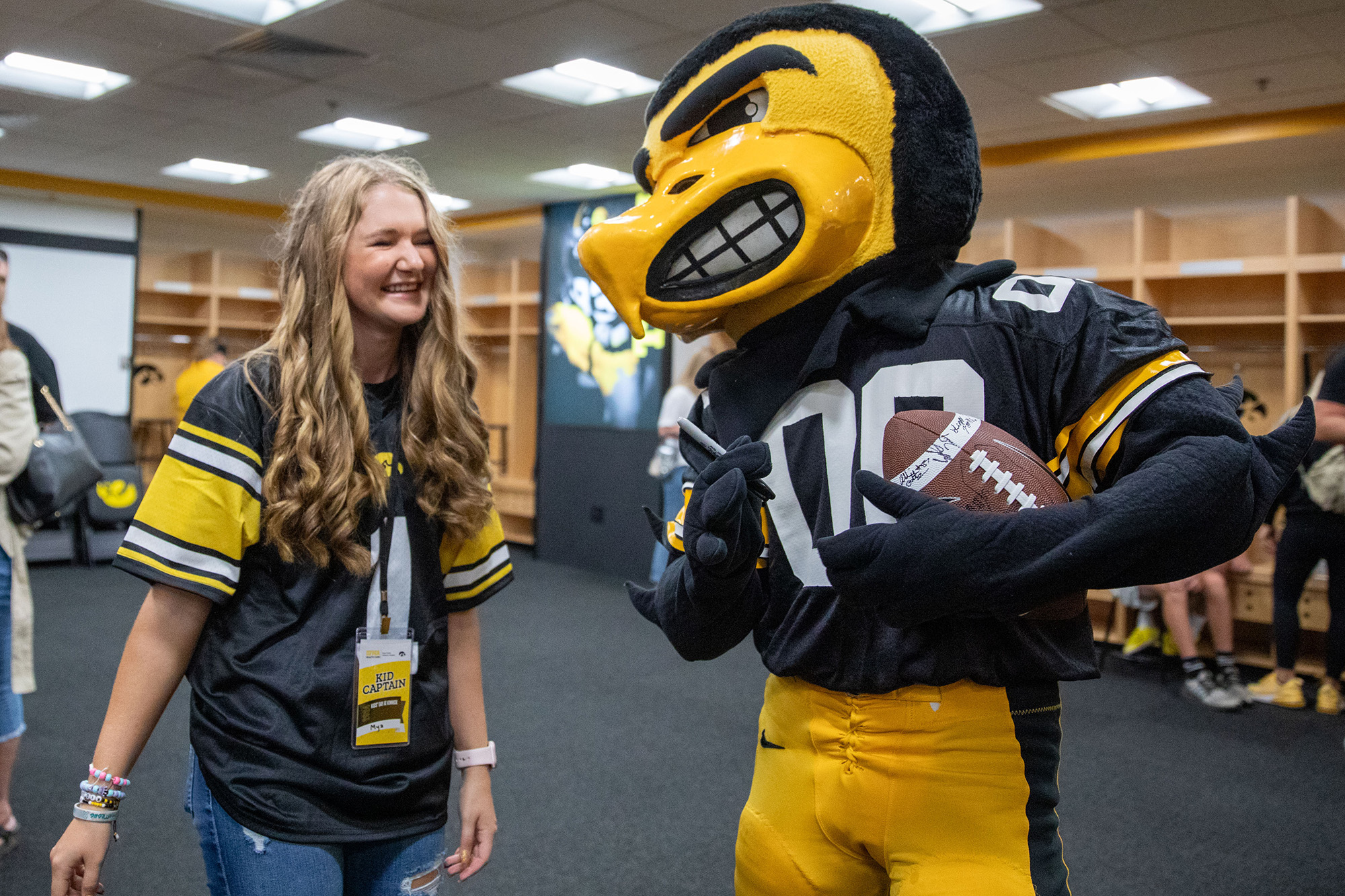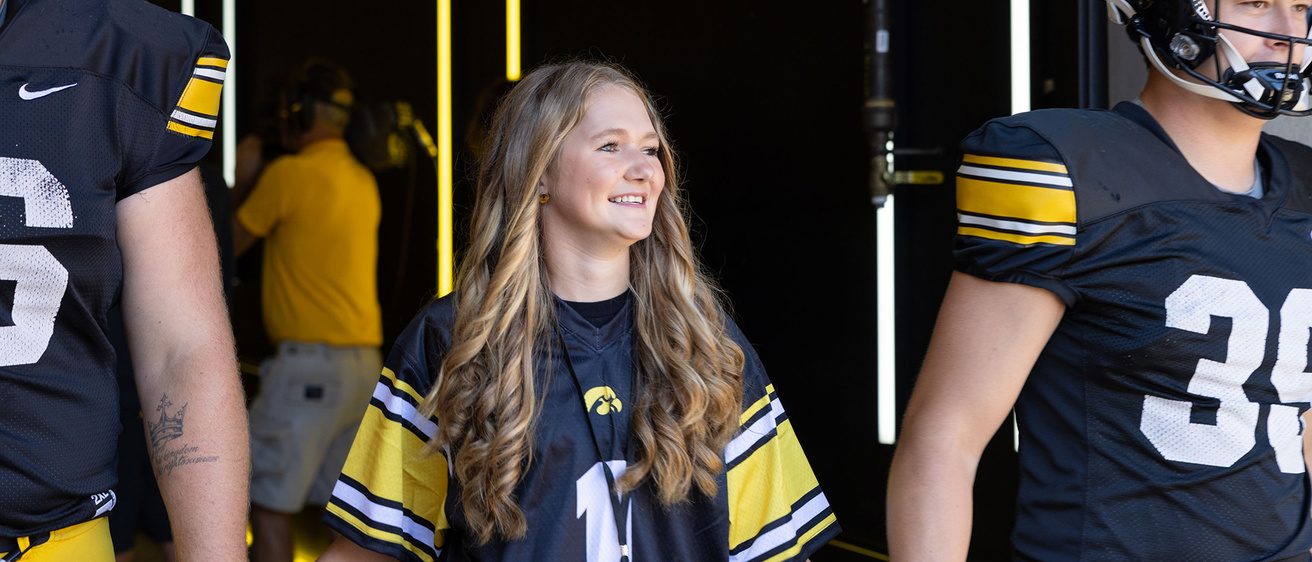Mya Gilchrist grew up at UI Health Care Stead Family Children’s Hospital, overcoming cancer several times. Her family is grateful for her care and continue to inspire others with Mya’s positive attitude.
Story and videography: UI Health Care Marketing and Communications
Photography: Kim Bui and Liz Martin
Published: Sept. 9, 2024
Throughout her childhood, Mya Gilchrist spent more than six years undergoing chemotherapy, with her first treatment beginning before she was 2 years old.
Her story begins when local doctors diagnosed her poor balance as an ear infection, a common ailment for an 18-month-old toddler. But Mya’s parents, Brooke and David, suspected something more serious.
“For me, the breaking point where we thought something was wrong was when Mya wanted to come to me and she couldn’t,” Brooke says. “She looked right at me, and she wanted to come to me, but she couldn’t, because every time she tried to come to me, she would veer off to the left.”
A slim chance from an experienced surgeon
Unnerved by this moment, the family returned to their local doctor. When Mya’s pediatrician was unavailable, she was seen by a new doctor who ordered an MRI. By this point, Mya’s parents knew it likely was serious. Their intuition proved correct when the MRI revealed a large tumor.
They were directed to Arnold Menezes, MD, an experienced neurosurgeon at University of Iowa Health Care Stead Family Children’s Hospital, who agreed to see Mya. Her prognosis was heartbreaking.
“He said, ‘No one else will operate on this, but I will. But if I do this operation, she has maybe a 10% chance of survival,’” Brooke recalls, “‘but if she goes home, she’ll have maybe two weeks to live.’”
The No. 1 children’s hospital in Iowa
University of Iowa Health Care Stead Family Children’s Hospital is Iowa’s only nationally ranked children’s hospital, offering all pediatric subspecialties and caring for kids from all 99 counties in Iowa. We provide world-class pediatric care that families trust — and kids deserve.
The couple agreed to proceed with the surgery, hoping their firstborn could beat the odds. Menezes performed an 11-hour debulking operation to remove as much of the tumor as possible. The tumor was found to be a cancerous form of pilocytic astrocytoma, a slow-growing brain tumor that originates from star-shaped cells called astrocytes.
“There weren’t a lot of different treatments known for Mya’s type of cancer at that time, and it’s not a very common type of childhood cancer,” Brooke says.
Because of its location in her brain stem, Mya’s tumor could not be completely removed.
Growing up in a children’s hospital
Mya’s care team decided on a 74-week course of chemotherapy, and Brooke and David were invited to be involved in the planning process during meetings with her entire team.
“We were listened to and heard. We were directly involved in Mya’s plan of care, and they made sure they answered all our questions,” Brooke says. “I don’t think either one of us ever gave up hope, and having a plan helped us a lot. We knew she was an amazing fighter and she wasn’t going to give up.”
When a child is in the hospital as long as Mya, staff worked to alleviate the stress of treatment and being away from home by finding opportunities for fun. One Halloween, Brooke recalls a nurse taking Mya, dressed as a piglet, and her younger sister, Leia, dressed as a lobster, trick-or-treating around the hospital, one of many occasions staff took the time to provide a sense of normalcy for the family and ensure that Mya “could still be a kid.”
“They treated us like we were all part of the family,” Brooke says.
Mya had a second brain surgery before starting another round of chemotherapy for 74 more weeks, most of which was spent in the hospital. It’s safe to say that Mya grew up at Stead Family Children’s Hospital.
“She had so many firsts there and they always made sure she didn’t miss a thing,” Brooke says. “Mya learned how to ride a tricycle there, she learned how to ride a bike there, she learned countless games and songs with music therapy and Child Life services. They made sure her primary focus was being a kid.”
“We are so lucky to have such an amazing facility so close to us. This entire team saved our child’s life and we are forever indebted to them for their care, love, and support.”
A battle into adolescence and beyond
The chemotherapy helped shrink the tumor, but Mya relapsed when she was 5, as the tumor began to grow. She completed another 74 weeks of chemotherapy under a new treatment protocol and did well for the next five years.
During a routine checkup when she was 12, however, Mya’s scans came back with bad news. She continued with treatment, and, at first, things went as expected. Then, nearly three years into this round of treatment, Mya was feeling the strain of being a teenager undergoing treatment for cancer. Mentally and physically drained, Mya asked her doctor, David Dickens, MD, FAAP, one of the hardest questions: could she stop treatment?
“He listened to Mya every step of the way and knew that Mya’s body was getting tired. Mya asked him if we could stop treatment and she wanted to know the risks,” Brooke says. “At that point, the risks of Mya’s physical and mental health outweighed the benefits of treatment, and he said if the tumor started to grow again, then we would cross that bridge if needed. He was so understanding and kind and discussed things directly with Mya.”
Dickens, who was experienced with the type of cancer Mya had, suggested a different course of treatment: three more weeks of chemo. Mya agreed and she recovered after the treatment, getting back her energy and the positive, lively personality she’s known for.

New disease, same ‘Mya Strong’
While Mya’s health care journey continues to this day, she also found a passion for giving back. During one of her many visits to Stead Family Children’s Hospital, Mya overheard a family discuss their struggles in the hospital lobby and it gave her an idea. At that time, Mya had a sum of money left over from a fundraiser held by her softball team.
“She said, ‘Mom, can we give that money away? I think I want to give it to families that need it.’ And I said, ‘That’s a perfect way to use that money,’” Brooke says. “And then we decided to continue with this mission of Mya, one focused on choosing kindness and helping others. That’s how we started the Mya Strong Foundation.
The foundation gives money to local pediatric oncology families to use as they choose, such as going on trips, purchasing a therapy dog, and more. The Mya Strong Foundation holds a local softball tournament to raise money, which started in 2019 with eight teams. Last year, the tournament grew to 59 teams not only from Iowa, but from the surrounding states.
A few years later, Mya became constantly tired, couldn’t focus, and was not feeling well. Tests showed her tumor was not growing, but a bone marrow biopsy last year revealed a mutation that causes the bone marrow to make too many red blood cells. The disease is treated by regular blood draws to siphon off some of the excess red blood cells.
Your child deserves the best cancer care available
At University of Iowa Health Care Stead Family Children’s Hospital, your child is treated by a specialist who is an expert in your child’s specific type of cancer, with access to the best treatments, including clinical trials of promising new therapies not yet widely available. And every member of our staff is specially trained to care for children, offering support, compassion, and hope to kids and their families, every step of the way.
“Mya is an incredibly resilient young woman with an attitude that brightens everyone she’s around,” says Dickens. “Like so many of our pediatric patients, she was dealt a medically tough hand. Seeing these kids fight and overcome their challenges is an extremely rewarding and inspiring part of our profession.”
Mya also suffered hearing loss as a side effect of some of the medication she was on and wears hearing aids. Biopsy results this August were good, with her health conditions remaining stable. Mya continues regular treatment at the hospital.
Now 18 and a high school senior, Mya hopes to become a registered nurse, loves choreography, and is on a dance team.
Brooke says Mya keeps a positive attitude despite all of the challenges she has faced and appreciates the care received at Stead Family Children’s Hospital over the years.
“They don’t just know who she is as a patient; they know who she is as a person,” she said. “We are so lucky to have such an amazing facility so close to us. This entire team saved our child’s life, and we are forever indebted to them for their care, love, and support.”
